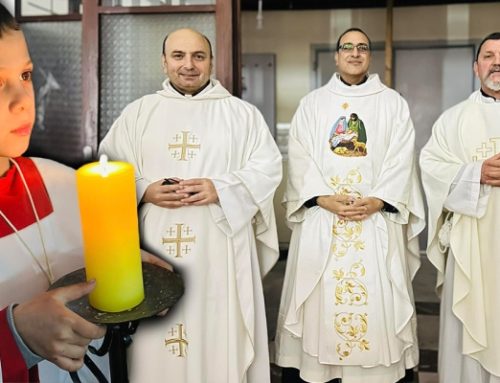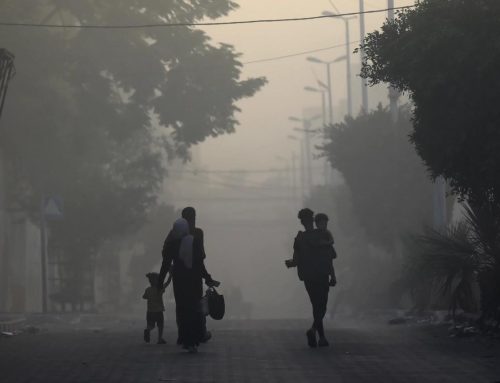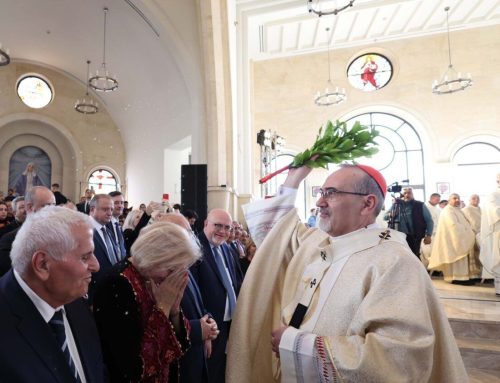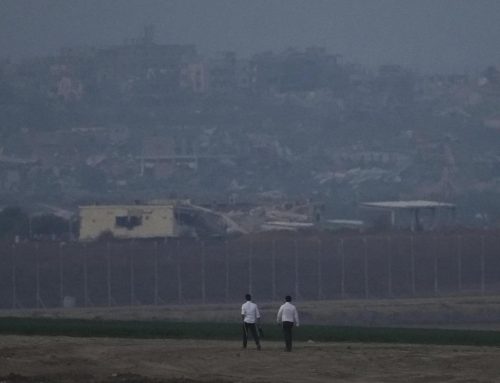Mideast: A new House report says Israeli-Palestinian leaders are ignoring the core of a peace settlement: their Christian population.
A political cartoon circulated a few years ago showed the three magi, guided by a luminous star, approaching the town of Bethlehem only to be stopped in their tracks by an ominous security wall. Although the magi arrived more than 2000 years ago, the allusion to a monstrous wall around Bethlehem is a present – day reality — one staring the indigenous Palestinian Christian community squarely in the face.
That is one of several hurdles facing Palestinian Christians that U.S. Rep. Henry Hyde (R-Ill.) hopes to bring to the attention of President Bush. Mr. Hyde recently sent a letter and detailed report to the president outlining the “fundamental challenges facing Christian institutions and their communities in the Holy Land,” and asserting that “the resolution of these items is central to any attempt of finding peace in the region,” according to Kirsti Garlock, counsel and spokesperson for the U.S. House of Representatives International Relations Committee.
The 82-year-old incumbent, currently serving his 32nd and final year in Congress, has been trying to bring the plight of Palestinian Christians to Washington’s attention since 2004 when he wrote to then-Secretary of State Colin Powell.
But this letter has a more urgent tone. Prompted by the March election of a new Israeli government and the subsequent promises to secure Israeli borders unilaterally by 2010, Mr. Hyde, chairman of the House International Relations Committee, put his team to work preparing a report about Christian emigration from Israel. The report attributes the exodus to several factors, including the growing security barrier, expanding settlements, and economic hardship endured by those who remain a double minority in a land beset with political turmoil.
The 480-mile security barrier currently under construction in Israel is one of the primary factors contributing to the hardships endured by Palestinian Christians in the West Bank. According to the Israeli Ministry of Foreign Affairs website, the fence (97 percent of the barrier will be chain-link fence while only 3 percent will be cement wall) is a “defensive, temporary, and passive measure against terrorism” spawned by the Palestinian Authority’s failure to fight terrorism. In areas where the barrier has been completed, it has done its job, the website states.
But others see it as a land-grab tactic that divides homogeneous regions and makes travel difficult or impossible for those desiring to worship or work in outlying areas.
Bethlehem is one example of a Christian town cut off by the barrier from its lifeblood in nearby East Jerusalem and its Christian sites, such as the Church of the Holy Sepulcher in the Old City. Rateb Rabie, president of the Holy Land Ecumenical Foundation (HCEF), an organization that promotes awareness of the Palestinian Christian situation, visited the region last year and said that Christians are losing hope. “If you see the wall and how it is encircling Bethlehem, it is sad. This is a Christian town,” Mr. Rabie said.
Fifty years ago, Christians were in the majority in Bethlehem, but growing emigration – including 2,000 Christians who left between 2000 and 2003 – means that Muslims now comprise the majority in the birthplace of Christ.
Shortly after his election victory, Prime Minister Ehud Olmert announced the importance of completing the barrier fence as a tool to combat terrorism in the region, and parts of the route were redrawn. The evenly mixed Christian and Muslim village of Aboud, just north of Ramallah in the West Bank, is feeling the effects of these changes and has gained the attention of Mr. Hyde. “The report states that the barrier in Aboud is jeopardizing strategic land, agriculture, produce and water resources. We want to reinforce that the U.S. has concerns too,” Ms. Garlock said.
Israeli government policy, however, states that the barrier will not confiscate any land, establish borders, or hinder farmers from reaching their crops.
The sluggish economy in the West Bank and Gaza is another factor contributing to the decline of a Christian presence in the region. With the Hamas-led Palestinian government struggling to pay its bills in the shadow of disapproval and the loss of vital economic aid from the West, Christians in the West Bank are feeling the effects of Hamas’ defiant refusal to acknowledge the state of Israel.
Mr. Hyde’s report also highlights the struggling service sectors manned by Palestinian Christians that provide vital education, health, and housing services in the West Bank. The report alleges that Israel is trying to tax several Christian institutions, including hospitals – a move that will eventually cause these entities to collapse.
These factors, combined with border closures, curfews, and time-consuming checkpoints, are an ever-present reality in the lives of all Palestinians, making survival a daily battle for Christians in particular.
The expansion of Israeli settlements is another key concern of Christians in the region. Israeli Defense Minister Amir Peretz recently approved the expansion of four settlements in the West Bank as part of the effort to beef up some parts of the territory before drawing final borders. The Christian triangle of Bethlehem, Beit Sahour, and Beit Jala in the south is already surrounded by Israeli settlements.
“The staff report indicates that in some areas housing and land shortages are limiting the natural growth of the community,” Ms. Garlock said. Settlements in the West Bank have been characterized as illegal by the United Nations, although not all international law scholars agree with this ruling.
But the source of Palestinian Christian emigration does not rest entirely on the shoulders of Israeli policy. Emigration of Christians from the West Bank spiked under Jordanian rule from 1948 to 1967, and a Palestinian government laden with an increasingly extreme Islamic presence does little to encourage Christians to remain in a territory where Shariah, or Islamic law, could be a part of a future state.
Palestinian towns also suffer from gunfire and military bombardment from both sides, and Muslim rioters have chosen the rooftops of Christian homes as outposts, inciting Israeli retaliation upon the Christian population.
All of these factors contribute to what some are calling the “museumification” of the indigenous Arab Christian population in Israel and Palestine. Dwindling numbers could lead to its disappearance several decades from now, with churches becoming mere museums and Christians only visible as tourists and tour guides.
Yet despite Palestinian Christians being caught in the middle of the conflict’s gridlock, very few invitations to join negotiations are extended toward this community. “We need two states with three faiths,” Mr. Rabie said. Lacking real representation in any Israeli-Palestinian negotiations, many find the Christian communities of the West more welcoming. Mr. Rabie says the number of Christians has diminished to about 50,000 in the Palestinian territories as many leave.
Mr. Hyde’s report hasn’t won widespread approval on Capitol Hill, but members of the International Relations Committee will meet with Vice President Dick Cheney’s staff this month. “This is not an attack on Israel. We are just adding another perspective – as reported to our staff by the Christian community – to the table that has not been considered and may be important in the effort to establish peace in the region,” Ms. Garlock said.
Mr. Rabie, however, is looking for help elsewhere. “We need some action from the Eastern church,” including prayer, financial support, and empowerment to build ties between Israelis and Arabs, Mr. Rabie said. “If we empower the Christians there, they can be the bridges between the Muslim Palestinians and the Israeli Jews.”
He would also like to see changes in word and deed by both parties in power: “We have two governments based on faith, and both are doing the same thing: creating unrest. Both need to come to their senses.”





